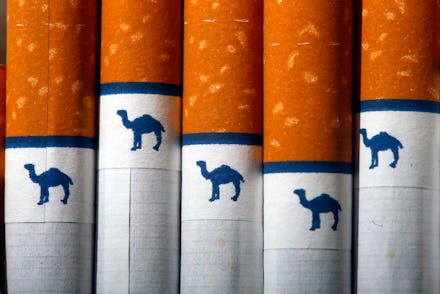Now Even Cigarette Companies Don't Want Their Employees to Smoke

The news: The maker of Camel cigarettes, Reynolds American Inc., will no longer let employees smoke in its offices.
The policy goes into effect in 2015 and will also ban tobacco products like pipes and cigars. This policy brings Reynolds American's offices in line with their factory floors, cafeterias and gyms, where smoking was already banned, the Associated Press reports.
There's one caveat: Reynolds American will still allow employees to use smokeless tobacco products like e-cigarettes, snuff and snus in their offices.
"We believe it's the right thing to do and the right time to do it because updating or tobacco use policies will better accommodate both nonsmokers and smokers who work in and visit our facilities," David Howard, a Reynolds American spokesman told the AP. "We're just better aligning our tobacco use policies with the realities of what you're seeing in society today."
The context: It's peculiar to see the company that once adamantly opposed public smoking bans suddenly ban smoking on its own properties.
Perhaps Reynolds American could no longer deny the deleterious effects of secondhand smoke (you know, the fact that it's even more toxic than regular cigarette smoke). For what it's worth, the company's website does tell smokers to "avoid exposing minors to secondhand smoke," and to comply with any other public smoking regulations "to respect the rights of other adults.
So what did that Reynolds American spokesman really mean when he mentioned "the realities of what you're seeing in society today?"
What we're seeing in society today is tobacco companies being forced to broadcast on network television and in newspapers they lied to consumers about smoking's ill-effects.
What we're seeing in society today is a sharp decline in smoking's popularity.
Reynolds American's anti-smoking stance could be a reaction to this trend. After all, it did recently purchase Lorillard — the market leader in e-cigarettes — for $27 billion, most likely as a way to offset declining revenue from tobacco products. Opinions are mixed enough on e-cigarettes that Reynolds American could convince some people that e-cigs are a "healthier" alternative to regular cigarettes.
The takeaway: Americans are becoming increasingly health conscious. Coke's sales are slipping, and McDonald's saw such a decline in sales it's now considering all sorts of radical options to convince people its food can be healthy. It's clear cigarette manufacturers, too, are trying to ride this wave.